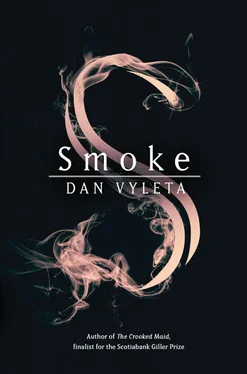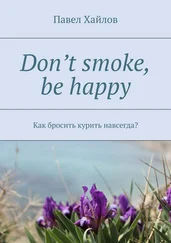This time, though, there is an alley running down the flank of the building, and a side door. In the mud outside, footprints are visible, amongst them, unmistakable, the heel of a woman’s boot. The door is closed but not locked. It is a carelessness that speaks of haste, of having one’s hands full. Beyond, a gaslight has been left burning. A corridor connects a string of offices, shabby-looking despite their once-decent carpets. It is a place of business, not of reception. Before they venture farther, Thomas turns on his heel and returns to the alley to relieve himself against the factory wall. It is a moment’s bliss in the middle of a nightmare.
Inside again, he finds Charlie and Livia have run ahead. The main floor holds the facilities associated with the sale and manufacture of ordinary tobacco. A front desk, an orders department; a workshop floor for packaging; and across the cobbled inner courtyard, a warehouse smelling like a giant pipe.
It is in the basement that the other factory is located. To enter one has to negotiate another, sturdier door, also left unlocked, and descend two revolutions of a carpeted spiral staircase. At its bottom a cavernous storehouse opens, suffused in a smell at once floral and rotting, emanating from a row of giant copper vats that loom like pillars in an old cathedral. Slender copper pipes emerge from these vats and move in coils towards a separate tank, minute by comparison, and holding the results of some long process of distillation. A cloying, wet heat stands in the room. Charlie has climbed the brass rungs riveted into one of the vats to get to its open top, has stuck a hand beyond the rim and is scooping up a palmful of its contents. Not far from him, Livia is examining a glass cabinet that holds a series of pharmaceutical bottles, each carefully labelled with dates.
“Flowers,” Charlie calls surprised, holding aloft a delicate stem crowned by a papery bloom, not unlike a poppy but of veined purple-grey. “The vat is filled to the rim with some kind of flower, submerged in warm liquid. There must be a million flowers here. And the smell. .” He sniffs his hand. “Like cigarettes, but faint.”
Livia, five steps from him, has uncorked one of the bottles and sniffed its contents.
“Sebastian mentioned flowers. He said: ‘A field of flowers for a dozen cigarettes.’ It must be how they produce the solvent: that which quickens Soot.” She lets her gaze wander between the giant vats and the small glass bottles with their labels, clearly struck by the misproportion. Almost reverently she accepts the flower Charlie holds out to her.
“Can you picture the size of the plantations, Charlie? Half of the Empire must be kept busy growing these.”
“In the full knowledge of the authorities, no doubt. And all part of the Cooper business empire. Your mother said we hold special import licences. One day I shall be very rich.”
Charlie’s eyes offer Thomas a share of his dark-cheeked indignation, but Thomas will have none of it. He is not interested in the Coopers’ stake in horticulture; stands unmoved, or re moved rather, still separated by the fog of his own thoughts.
Killer , he thinks. Blood brother.
The proverb’s right: the apple does not fall far.
Apples, falling. Isaac Newton: built a bridge without nails. Now they bring Germans over to build our sewers, Sebastian said. Ash-Town. Taylor, Ashton and some made-up Sons.
Father.
That piss was good, Thomas thinks. And you are a coward, a coward, wallowing in pity. He moves back into the staircase doorway, hooks his left arm into its frame, and wrenches his shoulder back into its socket.
ф
There is a room that leads off one end of the distillation chamber. A smaller room, boxlike and mould-walled, where a row of workbenches stand bolted to the floor. It is here that Thomas walks his sense of isolation; stands and studies it with self-absorbed patience.
Three workbenches, each with two work places. Each place marked by an oak stool and a little machine, screwed into the table’s wood, combining the features of a sewing machine and a pencil sharpener. Six stools in total, plus a chair for the supervisor, at three yards’ remove and upholstered in bottle-green leather. On the wall, like so many hats or umbrellas, hang six respirators from numbered metal hooks. Tan, well-worn rubber, each snout ending in a chunky, perforated filter, smeared with Soot. Thomas stares at these then sits down at a work place; turns the little wheel of one machine and works out its purpose. Around him, at the wall, stand small kegs of Soot each labelled with a quality sign, ranging from Alpha++ to Gamma — . At the centre of the workbench stands a box full of little squares of cigarette papers; next to it a similar box, somewhat larger, holds a supply of ordinary tobacco. A pipette completes the sets of tools and materials provided for each worker.
Mechanically, holding at bay both thought and emotion, Thomas threads a piece of paper into the machine, fetches a pinch of Soot from one of the barrels, mixes it with tobacco and begins to roll a cigarette. Halfway through the process he takes up the pipette; looks back through the doorway to the rack of solvents Livia has discovered; pictures spreading the sticky liquid into the mix of tobacco and Soot to make it ready for consumption.
“They are wearing the respirators,” he says out loud though he is speaking to himself, not his friends, “so they don’t imbibe any of the quickened Soot. It protects them, and also keeps them docile; and it ensures that not a precious gram is lost.” He gets up, fetches a respirator, spreads it out before him, goggles at the top. “And so they sit. Six slaves, masked, and strangers to one another. And the foreman, he will have a club.”
He hears Livia walking up behind him, listening to his words; continues with his numb recital of the facts.
“And that door over there with the heavy lock will lead next door. Did you notice it when we drove up? A big house like a fortress. Barred windows: a gaol. Of course, whoever works down here must never be released — otherwise they would go into the world and spread the news about cigarettes far and wide. No, they are stuck here for life. I wonder what crime warrants that? Something temperate, I should think. Forgery, counterfeiting, or some clever kind of theft. You wouldn’t want murderers near such Soot. They might get ideas.” He looks over at the kegs by the side of the wall. “What a paltry harvest! Dark Soot is a rare commodity. Until now. Pools, you say, a filtration system. Sebastian has been dredging the sewers to distil three hundred years of crime. No wonder Julius put up the money! Your mother must have told him it was to expand operations. The profits would have been astronomical. I doubt she told him it was all to go up in Smoke.”
He falls silent as Livia takes the stool next to him; watches her study his face.
“Does all this not make you angry, Thomas?”
He could say: I can’t afford my anger. It is too much fun.
Or: We have seen what my anger leads to.
Or: Back there, pressed hip to hip, my trousers wet with Julius’s blood, I could feel your pulse beat in your upper thigh.
But he merely shrugs his shoulders and watches her nostrils dilate around a stringy slug of Smoke.
ф
Charlie joins them. He has raced from room to room and wall to wall, inspected each shelf, each alcove, and each tool. Now he drops his weight onto a third stool.
“There is no sign of Lady Naylor. And no exit. Just that one”—he points over to the bolted door near them—“and you say it leads to the gaol. Which means we have lost her. We have lost Mowgli.”
When neither Thomas nor Livia responds, he jumps up, races around the rooms once more, frantically searching the walls for a clue. On his return he is too restless to sit; walks up and down in front of them, his face open, flushed, and worried.
Читать дальше












